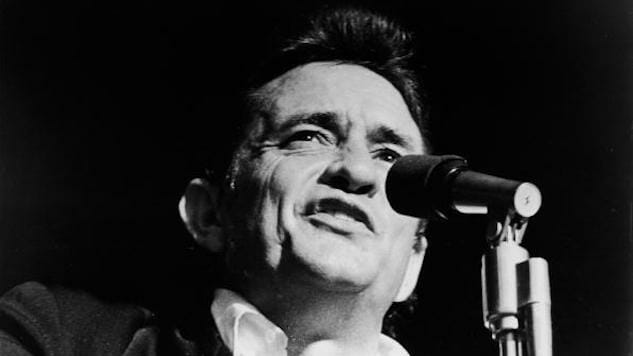Thom Zimny, Johnny Cash and the New Music Documentary
Photo via Hulton Archive/Getty
Over the past two years, Thom Zimny has become the leading director of music documentaries. Early last year he directed the two-part Elvis Presley: The Searcher, which played several film festivals before landing on the HBO menu. At the end of last year, Zimny’s Springsteen on Broadway was added to the Netflix offerings the day after the singer’s 14-month, one-man show in New York’s theatre district closed. And last month Zimny’s The Gift: The Journey of Johnny Cash premiered at South by Southwest’s Film Festival.
All three are superb portraits of iconic performers. The subject matter is important, obviously, but it’s Zimny’s treatment of it that sets these pictures apart. Springsteen on Broadway was a straightforward documentation of one self-contained performance, and while it does its job with admirable clarity and undistracted focus, it doesn’t reflect Zimny’s emerging style as much as the Presley and Cash movies do. The latter two films introduce some welcome changes into the music documentary.
For one thing, Zimny makes a clear separation between the visual and the audio. For example, he uses lots of talking heads on the audio track for the two films but never shows the heads on the screen. There are few things as visually boring as watching a chest-up shot of some old guy talking about things that happened long ago. The words may (or may not) be fascinating, but the image is not.
While his interviewees are talking (and for the Cash film, they include Rosanne Cash, Bruce Springsteen, Rodney Crowell, Rick Rubin and many more), Zimny fills the screen with vintage footage of Presley or Cash—either with music turned down low or no music at all. Sometimes, he uses that old Ken Burns trick of creating new images of the place where the events described occurred. No people are present in these scenes, and atmospheric sense of place comes across. And because place is essential to both these stories, that’s an effective strategy.
And sometimes Zimny recreates scenes, but not in the clumsy manner of some documentarians in the past. You never see faces in these restaged sequences, just props such as pills, guitars or windshields and maybe a shoulder, back or hand. This, too, is effective, because we see a visual representation of what’s being described on the audio track without ever being asked to believe that someone else’s face belongs to Presley or Cash. It’s as if these timeless scenes of driving down a highway to the next gig or shaking pills into an open palm have been repeated thousands of times, and Presley or Cash were just one iteration of the pattern.
A lot of songs are included in each movie, of course, but Zimny made the savvy decision in both cases to commission Pearl Jam’s Mike McCready to compose and record a soundtrack, as if this were a conventional dramatic film with scripted dialogue. McCready’s instrumental music is barely noticeable in the background, but it unifies the various voices—both talking and singing—with music that never quotes the subjects’ songs but reinforces the mood and continuity of each section.
After The Gift: The Journey of Johnny Cash screened at SXSW, Zimny and John Carter Cash (the only child Cash had with his second wife June Carter) came on stage at The Alamo Drafthouse to talk about the film. Zimny, looking a bit professorial in his dark blazer, translucent-frame glasses and salt-and-pepper beard, explained that he structured both the Presley and Cash movies around a pivotal moment in each man’s life. For Presley, it was the 1968 Comeback Special on NBC. For Cash, it was the famous performance at Folsom Prison in California the same year.
The Gift opens with new footage of the gate to the stone-fortress penitentiary, followed by gray-and-white footage of Cash and his wife walking across the yard. Soon Cash himself is on stage, just a few feet from the inmates, joking with them, telling stories and playing the songs the prisoners had once heard on the radio out in the real world. The script (written by musician Warren Zanes) makes it clear what a career gamble a live album from a prison was and how determined Cash was to reconnect with the down-and-out.
-

-

-

-

-

-

-

-

-

-

-

-

-

-

-

-

-

-

-

-

-

-

-

-

-

-

-

-

-

-

-

-

-

-

-

-

-

-

-

-








































